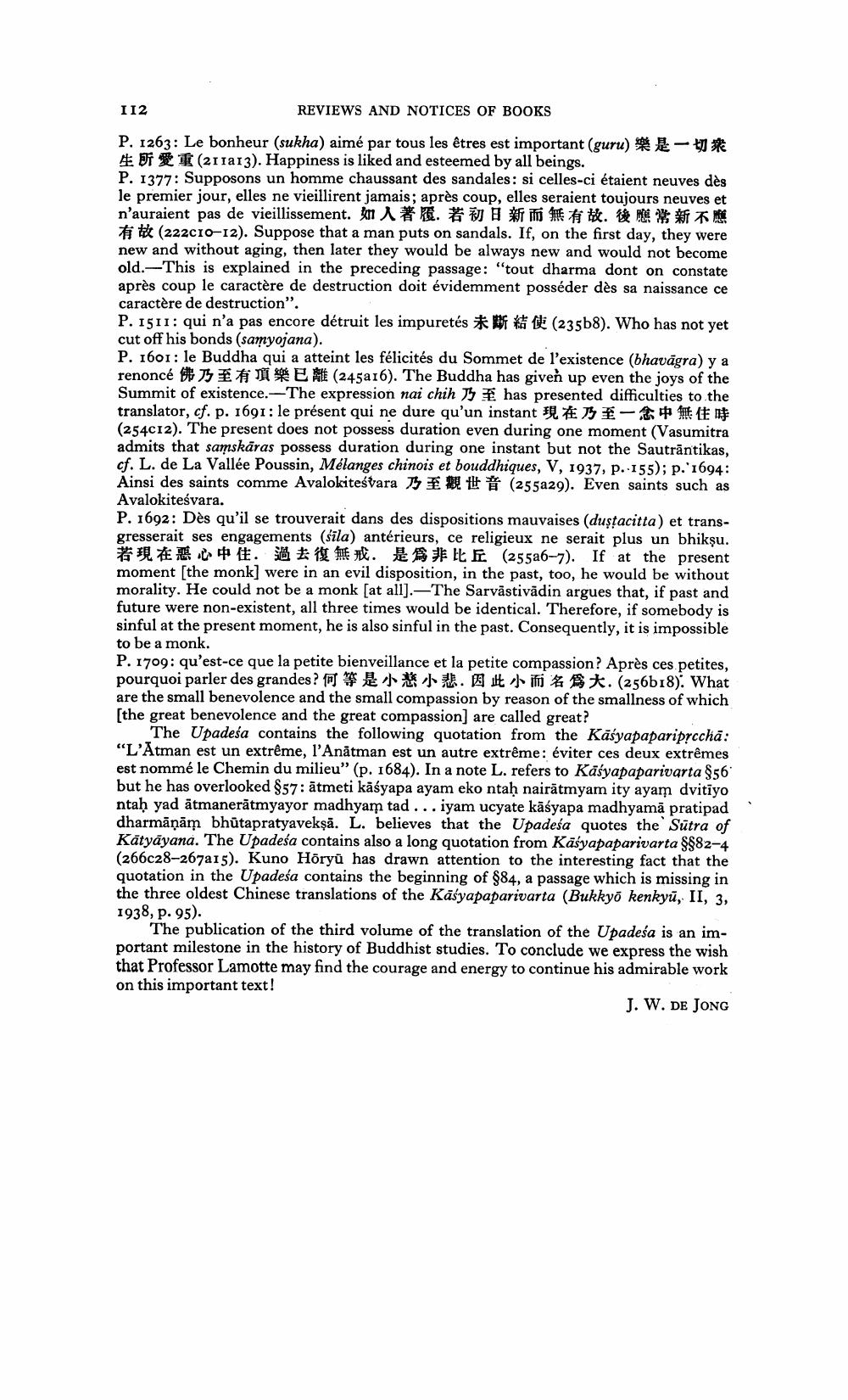________________ II2 REVIEWS AND NOTICES OF BOOKS P. 1263: Le bonheur (sukha) aime par tous les etres est important (guru) ** - * # * (211913). Happiness is liked and esteemed by all beings. P. 1377: Supposons un homme chaussant des sandales: si celles-ci etaient neuves des le premier jour, elles ne vieillirent jamais; apres coup, elles seraient toujours neuves et n'auraient pas de vieillissement. & E. * ici Etike. W: #ff E Hit (222010-12). Suppose that a man puts on sandals. If, on the first day, they were new and without aging, then later they would be always new and would not become old. This is explained in the preceding passage: "tout dharma dont on constate apres coup le caractere de destruction doit evidemment posseder des sa naissance ce caractere de destruction". P. 1511: qui n'a pas encore detruit les impuretes W (235b8). Who has not yet cut off his bonds (samyojana). P. 1601: le Buddha qui a atteint les felicites du Sommet de l'existence (bhavagra) y a renonce #15 #M E ME (245216). The Buddha has given up even the joys of the Summit of existence.-The expression nai chih 75 has presented difficulties to the translator, cf. p. 1691: le present qui ne dure qu'un instant EU # - MELE (254012). The present does not possess duration even during one moment (Vasumitra admits that samskaras possess duration during one instant but not the Sautrantikas, cf. L. de La Vallee Poussin, Melanges chinois et bouddhiques, V, 1937, p. 155); p.'1694: Ainsi des saints comme Avalokitesvara 5 E IL (255a29). Even saints such as Avalokitesvara. P. 1692: Des qu'il se trouverait dans des dispositions mauvaises (dustacitta) et transgresserait ses engagements (sila) anterieurs, ce religieux ne serait plus un bhiksu. # L#BC # # LE FC (255a6-7). If at the present moment [the monk] were in an evil disposition, in the past, too, he would be without morality. He could not be a monk [at all].--The Sarvastivadin argues that, if past and future were non-existent, all three times would be identical. Therefore, if somebody is sinful at the present moment, he is also sinful in the past. Consequently, it is impossible to be a monk. P. 1709: qu'est-ce que la petite bienveillance et la petite compassion? Apres ces petites, pourquoi parler des grandes? tp l i tt t. (256b 18). What are the small benevolence and the small compassion by reason of the smallness of which [the great benevolence and the great compassion] are called great? The Upadesa contains the following quotation from the Kasyapapariprccha: "L'Atman est un extreme, l'Anatman est un autre extreme: eviter ces deux extremes est nomme le Chemin du milieu" (p. 1684). In a note L. refers to Kasyapaparivarta $56 but he has overlooked $57: atmeti kasyapa ayam eko ntah nairatmyam ity ayam dvitiyo ntah yad atmaneratmyayor madhyam tad ... iyam ucyate kasyapa madhyama pratipad dharmanam bhutapratyaveksa. L. believes that the Upadesa quotes the Sutra of Katyayana. The Upadesa contains also a long quotation from Kasyapaparivarta 8882-4 (266c28-267015). Kuno Horyu has drawn attention to the interesting fact that the quotation in the Upadesa contains the beginning of $84, a passage which is missing in the three oldest Chinese translations of the Kasyapaparivarta (Bukkyo kenkyu, II, 3, 1938, p. 95). The publication of the third volume of the translation of the Upadesa is an important milestone in the history of Buddhist studies. To conclude we express the wish that Professor Lamotte may find the courage and energy to continue his admirable work on this important text! J. W. DE JONG




